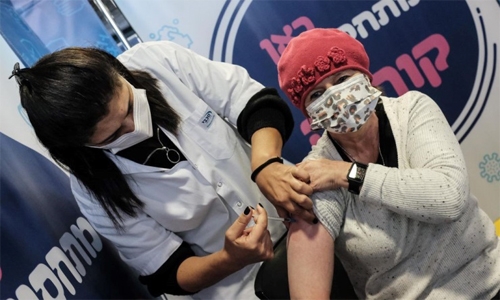'Surplus' Covid-19 vaccines cause jab frenzy In Israel
Agencies | Tel Aviv
The Daily Tribune – www.newsofbahrain.com
As Israel leads the race to vaccinate its citizens, many young and healthy people have managed to jump the queue and get doses that health workers say would have otherwise expired.
Selfies posted on social media depict masked faces with radiant eyes and proudly bared shoulders, along with stickers reading: "I too got vaccinated against Corona, for the health of us all.", Deutsche press agency (dpa) reported.
In the first phase of the vaccine rollout, the eligible groups include medical staff; lung transplant patients; immunosuppressed patients; patients with chronic conditions aged 55 plus; and oncology patients aged 16 plus.
But others are scrambling to find centres that might have a surplus, with the help of Facebook groups such as "coronavirus vaccines between friends," and people sharing information about vaccination stations that may end up with too many in Whatsapp groups.
Some have also headed to Arab towns, where turnout for vaccines is reported to be lower due to a higher sense of caution about the injection.
While some got lucky, others shared their experiences of driving around stations, queueing up for hours and returning home minus that coveted pinprick in their arm.
From mid-January, Israelis who have received two doses of the vaccine will be given a "green passport" that grants them various freedoms, including exemption from mandatory quarantine when entering Israel from abroad.
Some citizens feel they are missing out by patiently waiting their turn. Others are concerned that younger and healthier people may be getting the vaccine at the expense of at-risk patients.
With half of the first batch of doses almost used up and the remainder reserved for the second doses, it appears likely that the vaccination operation will have to be paused. It is unclear when the next batch will arrive in Israel.
But representatives of the health system say that, given a vast and complex operation, and working with short shelf lives and unpredictable cancellations, it is preferable to vaccinate healthy people rather than throw the doses away. They also maintain that the proportion of those outsides of the target groups getting vaccinated is small.
Health Minister Yuli Edelstein said on Wednesday that almost 1.5 million people in Israel had been vaccinated, 115,000 of them the day before.
The N12 website reported this week that between 30-40 per cent of those vaccinated are under the age of 60.
There were no figures available regarding how many of those were in other target groups, such as at-risk patients, medics or police officers.
The Health Ministry did not respond to a request for this data.
"We need to separate the basic things that are happening and what is happening in the margins," Arnon Afek, deputy director-general of Sheba Medical Centre at Tel Hashomer Hospital in central Israel.
"Of course, when you work so fast and take into account that the Pfizer vaccine cannot be used after five days ... in certain places there will be extra vaccines that will be delivered to younger people," he says.
The Pfizer-BioNtech can be stored for five days, refrigerated at 2-8 degrees Celsius.
Once a vial of the Pfizer-BioNtech vaccine, containing six doses, is opened and diluted, it must be used within six hours.
"There are some places where people did not show up, so people are very innovative in Israel and tell each other where they can get vaccinated," Afek says.
Ido Hadari, the spokesperson for Israel's second-largest health management organization, Maccabi, estimates there was a 2-per-cent "no-show" rate at its facilities.
Maccabi says that 83 per cent of all those vaccinated belong to the risk groups, in accordance with the Health Ministry instructions. The other 17 per cent include health care staff, carers of the elderly and immunocompromised patients, it says.
"Sometimes at the end of the day we have several doses leftover and if there are no at-risk people then we start to slowly go down in the ages - but these are really small numbers," Hadari says. On Saturday, he notes, they had a supply they needed to finish so they called on police firefighters and prison workers to come and use up the leftovers.
Maccabi has a reputation among vaccine-seekers as being the toughest in the country when it comes to surplus doses. Others are said to hand them out more liberally.
Nataly Avrahami, a spokesperson for Israel's largest health group, Clalit, says 71 per cent of those vaccinated are aged 60 and older. Another 9-14 per cent are from at-risk groups and aged 55 and over. Those vaccinated outside of priority groups, she says "are in the margins."
Clalit has vaccinated 680,000 patients thus far, she said on Wednesday.
"It is a race to vaccinate a large number of elderly people and at-risk populations and vaccinate quickly to try to stop the spread of the plague," Avrahami told dpa.
"People see the vaccine as a key to returning to life before the epidemic," she says. "The hope is that this will change the picture in Israel within a month or two."
Hadari too sees the hype around the vaccines as a positive thing: "I want this vibe to continue as long as possible - it's better to deal with a high demand than with a low demand."
Related Posts

